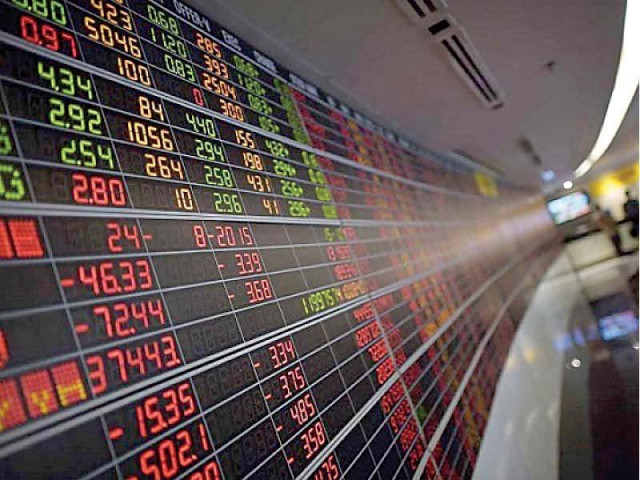PSX outlook remains gloomy ahead of tough IMF programme
Experts say index is yet to bottom out amid massive changes in top economic team

The benchmark index is down around 33% since hitting an all-time high at around 53,000 points in May 2017. PHOTO: FILE
Interestingly, foreign investors, who had been net sellers for over three years, are seen making renewed buying for several weeks.
Experts said the market outlook was bleak and the benchmark KSE-100 index was yet to bottom out as massive changes in the government’s economic team at the top level indicated that the new State Bank of Pakistan (SBP) governor and the new Federal Board of Revenue (FBR) chairman were likely to take tough measures.
A further increase in the key interest rate, more depreciation of the rupee, hike in tax rates, end of tax exemptions and imposition of new taxes in an attempt to narrow down a widening fiscal deficit and improve the foreign payment capability seem to be on the cards.
'IMF had Asad Umar removed; Reza Baqir delivered the message'
“Recent developments suggest the existing downward trend will continue at the PSX (Pakistan Stock Exchange). The benchmark index may lose further ground in the range of 500-3,000 points till the IMF and budget uncertainties are over,” JS Research Head of Corporate Sales Syed Atif Zafar told The Express Tribune.
While breaking the past five sessions’ negative streak, the KSE-100 index gained a meagre 25.64 points to close near the three-year low at 35,631.06 points on Tuesday.
The index has lost 17.6%, or 6,277 points, since July 2, 2018 to date. Also, the index is down around 33% since hitting an all-time high at around 53,000 points in May 2017. As the market hit the peak, there were expectations that foreign investors would take heavy positions ahead of Pakistan’s reclassification into the MSCI Emerging Markets Index from the MSCI Frontier Market after a gap of nine years.
Zafar said there were fears that Pakistan may further increase the key interest rate, let the rupee depreciate further, revise upwards utility tariffs and slash the development expenditure. Moreover, the government may also take strict measures to increase tax collection.
“The unfolding of such events ahead of the IMF bailout and budget presentation will keep the market under selling pressure,” he said. The sectors, which would lead the show, would include cement, steel and autos. Banking stocks, however, may manage to invite renewed buying keeping in view the high interest rate scenario, he added.
Arif Habib Limited Head of Research Samiullah Tariq agreed that the IMF and budget uncertainties had not yet been over. “However, the benchmark index has bottomed out and it will continue to remain near and around current levels till the finalisation of the IMF programme…it will move in a narrow band of 200-500 points,” he said.
Pakistan's debt worth $27b to mature in two years: IMF
Besides banking stocks, the oil and gas exploration and power companies listed at the PSX would also invite renewed buying as the rupee depreciation went in their favour.
He voiced hope that Pakistan would sign an IMF loan programme between May 10 and 15 while the budget was scheduled to be presented on May 24.
Foreign investors were net buyers of $4.5 million worth of stocks on Monday, according to the National Clearing Company of Pakistan Limited (NCCPL). They bought shares worth a net $10.8 million since April 1 and $41.5 million since January 1.
They, however, appeared net sellers of $362.2 million since July 2, 2018, according to the NCCPL.
Previously, the central bank increased the benchmark interest rate by five percentage points since January 2018 to a six-year high of 10.75% at present. Besides, it let the rupee depreciate 34% to 141.3 to the US dollar since December 2017. The events badly jolted the stock market, experts said.
Published in The Express Tribune, May 8th, 2019.
Like Business on Facebook, follow @TribuneBiz on Twitter to stay informed and join in the conversation.





1733130350-0/Untitled-design-(76)1733130350-0-208x130.webp)












COMMENTS
Comments are moderated and generally will be posted if they are on-topic and not abusive.
For more information, please see our Comments FAQ